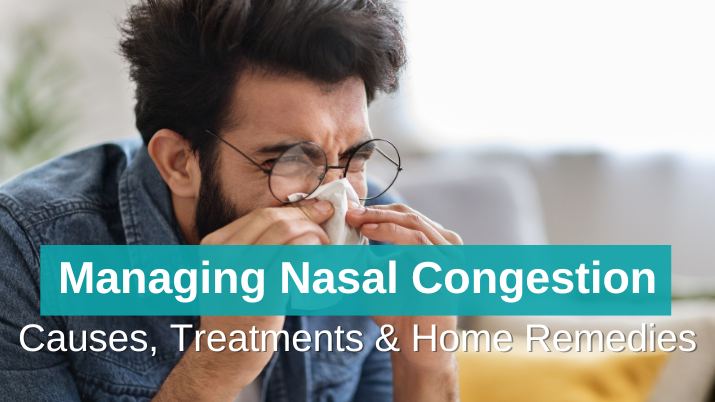Nasal congestion, commonly known as a stuffy nose, is a widespread issue that affects individuals of all ages. It occurs when the nasal passages become inflamed and swollen, making breathing difficult. While nasal congestion is not usually a serious condition, it can be uncomfortable and disruptive to daily activities. Understanding its causes, treatment options, and home remedies can help manage symptoms effectively.
Causes of Nasal Congestion
Nasal congestion can be triggered by various factors, including:
Common Cold and Flu: Viral infections such as the cold and flu cause inflammation in the nasal passages, leading to congestion.
Allergies: Exposure to allergens like pollen, dust, pet dander, and mold can cause nasal congestion due to an immune system response.
Sinus Infections: Sinusitis, or inflammation of the sinuses, leads to mucus buildup and nasal blockage.
Deviated Nasal Septum: A structural issue in the nose can make one nasal passage narrower, resulting in persistent congestion.
Environmental Irritants: Smoke, strong odors, and air pollution can irritate the nasal passages and contribute to congestion.
Hormonal Changes: Pregnancy, thyroid disorders, and hormonal fluctuations can cause nasal swelling and congestion.
Medication Overuse: Overuse of nasal sprays and decongestants can lead to rebound congestion, worsening the condition over time.
Effective Home Remedies for Nasal Congestion
For mild to moderate nasal congestion, home remedies can provide relief without the need for medication:
Stay Hydrated: Drinking plenty of water helps thin mucus, making it easier to clear from the nasal passages.
Use a Humidifier: Adding moisture to the air prevents nasal passages from drying out and reduces congestion.
Saline Rinse: A neti pot or saline spray can help flush out mucus and allergens, improving airflow.
Steam Therapy: Inhaling steam from a bowl of hot water or taking a warm shower can provide quick relief.
Elevate Your Head: Sleeping with an elevated head position helps drain mucus and reduces nighttime congestion.
Essential Oils: Eucalyptus and peppermint oils have decongestant properties and can be used for steam inhalation or applied topically.
When to Seek Medical Attention
While nasal congestion is usually temporary, seek medical advice if:
Symptoms persist for more than ten days.
There is a high fever accompanying congestion.
You experience facial pain or swelling around the eyes.
There is thick, green, or yellow nasal discharge.
You have difficulty breathing or severe headaches.
Conclusion
Nasal congestion can be bothersome, but with the right approach, it can be effectively managed. Understanding its causes helps in choosing the appropriate treatment, whether through medical options or simple home remedies. Staying hydrated, using humidifiers, and practicing good nasal hygiene can go a long way in preventing and relieving congestion. If symptoms persist, consulting a healthcare professional is recommended for proper diagnosis and treatment.




